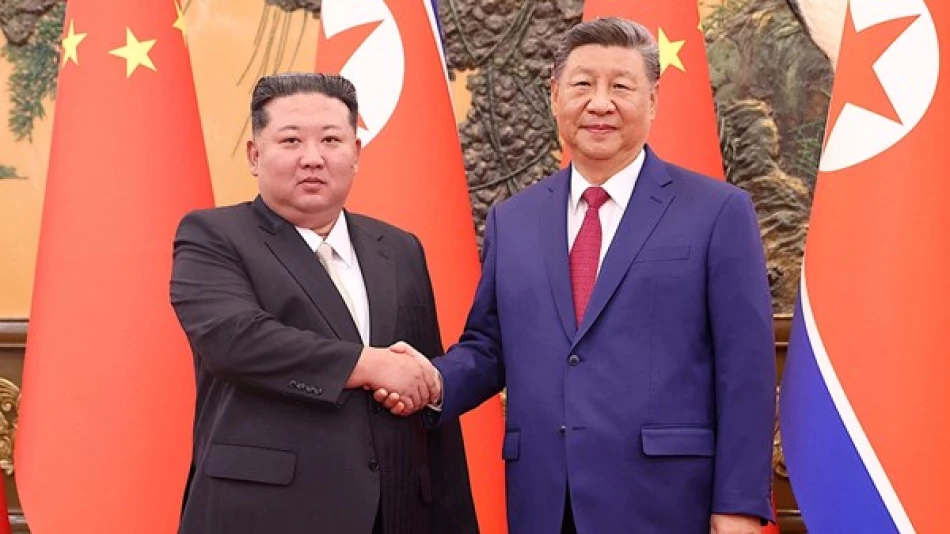
China Emphasizes North Korea's Enduring Strategic Value to Beijing
China Doubles Down on North Korea Alliance as Global Tensions Rise
Chinese President Xi Jinping delivered an unequivocal message of support to North Korean leader Kim Jong Un during rare high-level talks in Beijing, pledging that China's commitment to its isolated neighbor "will not change" regardless of shifting international dynamics. The meeting, held alongside a massive military parade commemorating the 80th anniversary of World War II's end, signals Beijing's determination to maintain its strategic partnership with Pyongyang despite mounting global pressure.
A Rare Diplomatic Showcase in Beijing
Kim's visit to China represents one of his infrequent foreign trips, underscoring the significance both nations place on their relationship. The North Korean leader joined Xi and Russian President Vladimir Putin for the military parade, creating a powerful visual of authoritarian solidarity that will likely unsettle Western capitals.
During evening talks at Beijing's Great Hall of the People, Xi emphasized China's "great importance" to the traditional friendship between the two countries, promising to "maintain, consolidate and develop" bilateral relations. His assurance that this position remains constant "no matter how the international situation changes" appears designed to reassure Pyongyang of China's unwavering support.
Strategic Calculations Behind the Partnership
China's North Korea Dilemma
Beijing's continued backing of North Korea reflects complex strategic calculations. China views North Korea as a crucial buffer against U.S.-allied South Korea and American military presence in the region. Despite occasional frustration with Pyongyang's nuclear ambitions and unpredictable behavior, China consistently prioritizes regional stability over international pressure for tougher sanctions.
This relationship has proven remarkably durable through multiple international crises, including North Korea's nuclear tests and missile launches. China's trade with North Korea remains vital for the isolated nation's survival, giving Beijing significant leverage while maintaining plausible deniability about sanctions enforcement.
Timing and Global Context
The meeting occurs amid heightened tensions between China and the West over Taiwan, trade disputes, and technology competition. By publicly reaffirming ties with North Korea, Xi sends a clear message that China will not abandon strategic partners under international pressure. This stance mirrors China's approach to other controversial allies, including Russia and Iran.
The inclusion of Putin in the commemorative events adds another layer of significance, showcasing an axis of nations increasingly aligned against Western influence. This trilateral dynamic represents a fundamental shift in global power structures that Western policymakers cannot ignore.
Economic and Security Implications
Xi's pledge to enhance "high-level strategic communication" and expand "practical cooperation in various fields" suggests deeper economic integration ahead. This could include increased trade, infrastructure development, and technology transfers that help North Korea modernize its economy while maintaining political control.
For regional security, the strengthened China-North Korea partnership complicates U.S. and South Korean strategic planning. Any military contingency on the Korean Peninsula must now account for explicit Chinese backing of North Korea, raising the stakes for all parties involved.
Looking Ahead: Implications for Global Diplomacy
This diplomatic embrace effectively ends any hopes that economic pressure might drive a wedge between Beijing and Pyongyang. Instead, it demonstrates how authoritarian regimes are increasingly coordinating responses to Western pressure, creating alternative power structures that challenge the post-World War II international order.
The sight of Kim's armored train departing Beijing after the successful visit symbolizes a relationship that has weathered decades of international turbulence. For diplomats and analysts worldwide, this meeting confirms that China's support for North Korea represents a core strategic commitment, not a temporary convenience subject to international pressure or changing circumstances.
Most Viewed News

 Layla Al Mansoori
Layla Al Mansoori






